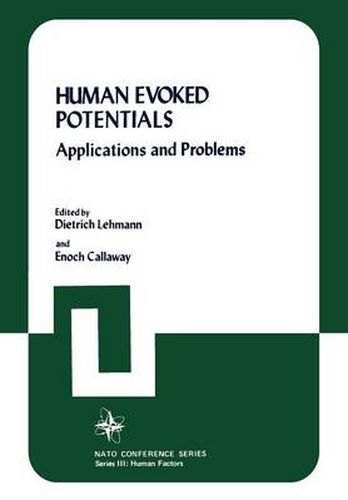Readings Newsletter
Become a Readings Member to make your shopping experience even easier.
Sign in or sign up for free!
You’re not far away from qualifying for FREE standard shipping within Australia
You’ve qualified for FREE standard shipping within Australia
The cart is loading…






This title is printed to order. This book may have been self-published. If so, we cannot guarantee the quality of the content. In the main most books will have gone through the editing process however some may not. We therefore suggest that you be aware of this before ordering this book. If in doubt check either the author or publisher’s details as we are unable to accept any returns unless they are faulty. Please contact us if you have any questions.
From August 25 - 28, 1978 a conference on averaged evoked po- tentials was held at Konstanz, West Germany. Research on human evoked potentials has progressed rapidly in the past decade, and a series of international conferences have served to maintain com- munication between active workers in the field. Among the organiza- tions that have a tradition of supporting such mUlti-national com- munication are the North Atlantic Treaty Organization Scientific Affairs Division, the u.s. Office of Naval Research and the German Research Society (Deutsche Forschungsgemeinschaft). We have been fortunate to have the support of all three. In the early stages of planning, a committee was formed composed of Professors Rudolph Cohen (Konstanz), Otto Creutzfeldt (Goettingen), John Desmedt (Brussels), A.M. Halliday (London), Anthony Remond (Paris) and Herbert Vaughan (New York). A call for papers was circulated as widely as possible, and this committee carried out the difficult task of selecting a limited number of participants from a large number of excellent abstracts. At the same time Professor Cohen of the University of Konstanz was generous enough to shoulder the task of playing host to the conference. His thoughtful arrangements contributed enormously to the comfort of the participants. He and his colleagues also engi- neered an ideal ambience for sharing of ideas and observations, while the University of Konstanz generously provided audio-visual support.
$9.00 standard shipping within Australia
FREE standard shipping within Australia for orders over $100.00
Express & International shipping calculated at checkout
This title is printed to order. This book may have been self-published. If so, we cannot guarantee the quality of the content. In the main most books will have gone through the editing process however some may not. We therefore suggest that you be aware of this before ordering this book. If in doubt check either the author or publisher’s details as we are unable to accept any returns unless they are faulty. Please contact us if you have any questions.
From August 25 - 28, 1978 a conference on averaged evoked po- tentials was held at Konstanz, West Germany. Research on human evoked potentials has progressed rapidly in the past decade, and a series of international conferences have served to maintain com- munication between active workers in the field. Among the organiza- tions that have a tradition of supporting such mUlti-national com- munication are the North Atlantic Treaty Organization Scientific Affairs Division, the u.s. Office of Naval Research and the German Research Society (Deutsche Forschungsgemeinschaft). We have been fortunate to have the support of all three. In the early stages of planning, a committee was formed composed of Professors Rudolph Cohen (Konstanz), Otto Creutzfeldt (Goettingen), John Desmedt (Brussels), A.M. Halliday (London), Anthony Remond (Paris) and Herbert Vaughan (New York). A call for papers was circulated as widely as possible, and this committee carried out the difficult task of selecting a limited number of participants from a large number of excellent abstracts. At the same time Professor Cohen of the University of Konstanz was generous enough to shoulder the task of playing host to the conference. His thoughtful arrangements contributed enormously to the comfort of the participants. He and his colleagues also engi- neered an ideal ambience for sharing of ideas and observations, while the University of Konstanz generously provided audio-visual support.